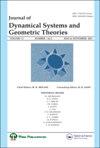On Differential Geometric Formulations of Slow Invariant Manifold Computation: Geodesic Stretching and Flow Curvature
IF 0.2
Q4 MATHEMATICS
Journal of Dynamical Systems and Geometric Theories
Pub Date : 2019-12-02
DOI:10.1080/1726037X.2022.2060909
引用次数: 0
Abstract
Abstract The theory of slow invariant manifolds (SIMs) is the foundation of various model-order reduction techniques for dissipative dynamical systems with multiple time-scales, e.g. in chemical kinetic models. The construction of SIMs and many approximation methods exploit the restrictive requirement of an explicit time-scale separation parameter. Most of those methods are also not formulated covariantly, i.e. in terms of tensorial constructions. We propose an intrinsically coordinate-free differential geometric approximation criterion approximating normally attracting invariant manifolds (NAIMs). We translate some ideas behind existing approximation approaches, the stretching based diagnostics (SBD) and the flow curvature method (FCM) to tensors of Riemannian geometry, specifically to spacetime curvature in extended phase space. For that purpose we derive from flow-generating smooth vector fields a metric tensor such that the original dynamical system is a geodesic flow on a Riemannian manifold. We apply the resulting method to test models.慢不变流形计算的微分几何公式:测地线拉伸和流动曲率
慢不变流形(slow invariant manifold, SIMs)理论是多种多时标耗散动力系统模型降阶技术的基础,如化学动力学模型。SIMs的构造和许多近似方法利用了明确的时间尺度分离参数的限制性要求。这些方法中的大多数也不是协变的,即在张量结构方面。提出了一种近似常吸引不变流形的本质无坐标微分几何逼近准则。我们将现有的近似方法,基于拉伸的诊断(SBD)和流动曲率方法(FCM)背后的一些思想转化为黎曼几何的张量,特别是扩展相空间中的时空曲率。为此,我们从产生流的光滑向量场中导出一个度量张量,使得原始动力系统是黎曼流形上的测地线流。我们将得到的方法应用于测试模型。
本文章由计算机程序翻译,如有差异,请以英文原文为准。
求助全文
约1分钟内获得全文
求助全文

 求助内容:
求助内容: 应助结果提醒方式:
应助结果提醒方式:


